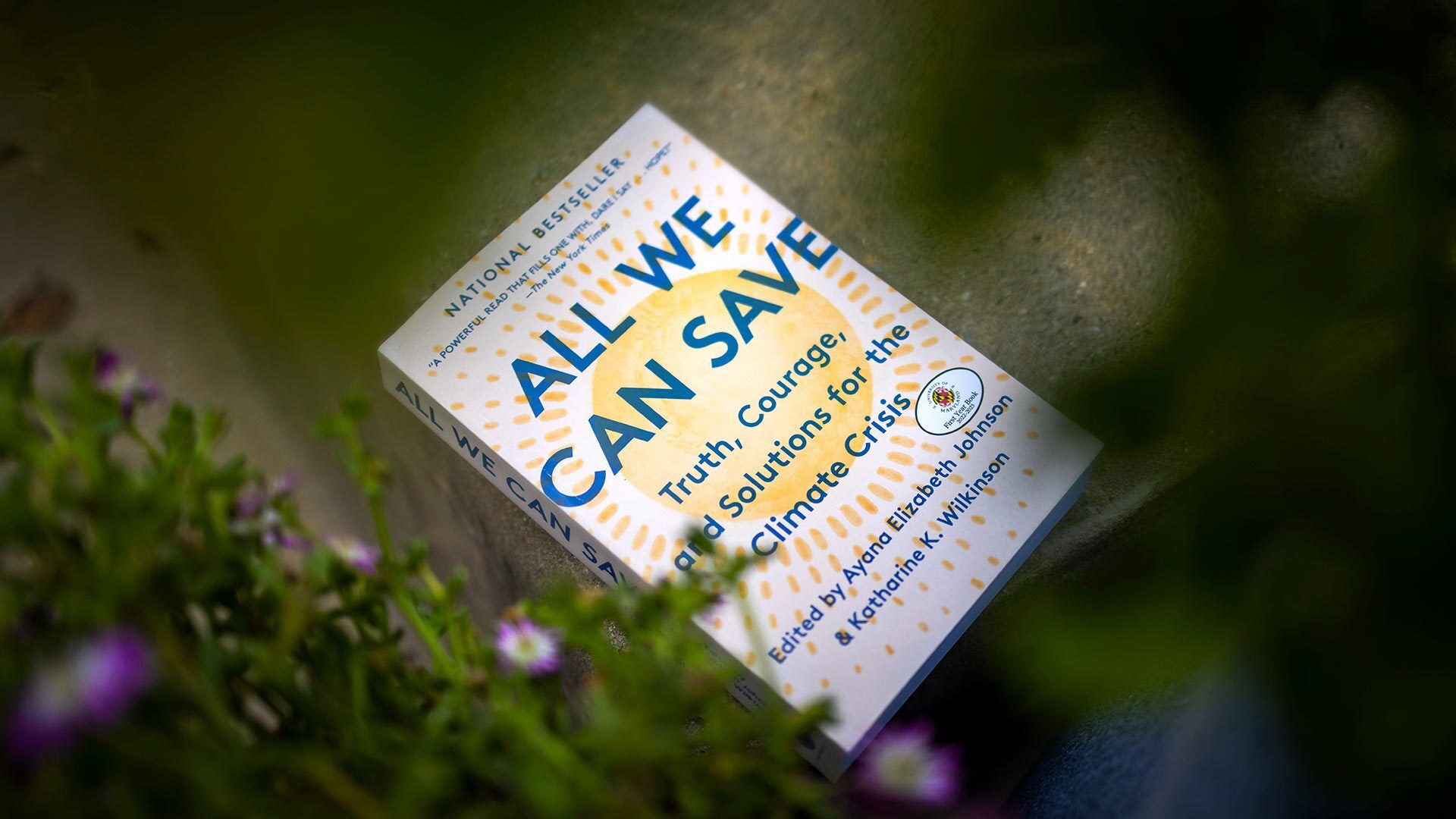- September 01, 2022
- By Liam Farrell
From fiercer heat waves and stronger hurricanes to increasingly deadly flash floods and fires, the destruction associated with a warming world can easily induce despair at a fight already lost.
But the University of Maryland’s 2022-23 First Year Book is designed to not only prevent Terps from succumbing to that feeling, but inspire them to fight on. In the anthology “All We Can Save: Truth, Courage and Solutions for the Climate Crisis,” a diverse collection of women across the professional and artistic spectrum reflect on how climate change is an opportunity to reshape our world.
“To transform society this decade—the clear task science has set before us—we need transformational leadership. We need feminine and feminist climate leadership, which is wide open to people of any gender,” environmental activists and editors Ayana Elizabeth Johnson and Katharine K. Wilkinson write in the book. “This is where possibility lives—possibility that we can turn away from the brink and move toward a life-giving future for all.”
The First Year Book program has been an annual effort since 1993 and is designed to have students engage with the same topic across campus in a “shared intellectual experience” and learn how to debate and disagree respectfully, said Lisa Kiely, associate dean for undergraduate studies and ombudsperson. Past books have included “The Refugees” by Viet Thanh Nguyen, “The Immortal Life of Henrietta Lacks” by Rebecca Skloot and last year’s selection, “What the Eyes Don’t See: A Story of Crisis, Resistance, and Hope in an American City” by Dr. Mona Hanna-Attisha.
Special events and discussions are planned for throughout the school year. A virtual event will be held at 3 p.m. Oct. 26 with Favianna Rodriguez, a book contributor and president of the Center for Cultural Power, an organization that supports artists through fellowships, training and other opportunities.
The program is also promoting ways to get involved locally and regionally, including information on groups such as the Center for Rural Enterprise and Environmental Justice, the Chesapeake Climate Action Network and Earth Justice, as well as internships in environmental science and policy, and with the UMD Office of Sustainability.
“This isn’t just for the scientists or the policymakers or the lawyers. We need artists, we need psychologists, we need all kinds of folks for it,” Kiely said. “Everybody has a role in this.”
Evan Golub, a senior lecturer and researcher in the Department of Computer Science and an assistant director of the Human-Computer Interaction Lab, said he’ll incorporate the book into his creative coding class so students can think about how computer programs can not only carry out logistical solutions, but also educate and advocate.
“Technology can do very efficient programming for wind turbines,” he said. “But if you allow users to click somewhere on the planet and then show them an animation of that spot over the last 50 years, that’s going to potentially give people something new to think about.”
Elisabeth Maring, associate director of the Global Health Initiative and director of the Global Public Health Scholars program, said the book will be a way for students to understand how climate change interacts throughout our health and welfare—and the urgency to do something about it.
“Gloom and doom doesn’t really motivate students or really anyone,” she said. “(The book) doesn’t dwell on those disempowering messages. It really focuses on strategies for climate resilience.”
Copies of the First Year Book, “All We Can Save: Truth, Courage and Solutions for the Climate Crisis,” are free to all UMD students, faculty and staff members. Students can pick up one at the Stamp Student Union Information Desk, and staff and faculty can do so at the Office of Undergraduate Studies, 2110 Marie Mount Hall. To request boxes of books, please email fyb@umd.edu.
Topics
Campus & Community